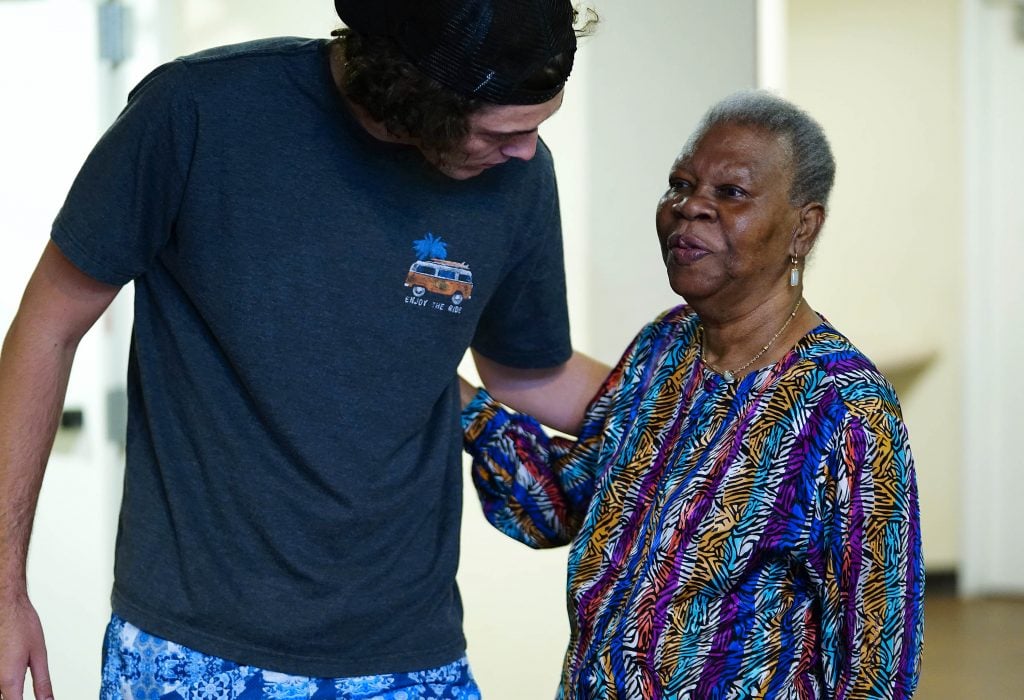
EDITOR'S NOTE: This story originally appeared in the April issue of GCU Magazine. Read the digital version here.
Photos by Ralph Freso
On any given night, you might see a Grand Canyon University student leaning over to a senior citizen who has no family near and ask her if she wants to sing.
Or you might see students lifting a big box onto a shelf in a campus warehouse that contains a dining room table, which will be donated to a family who doesn’t have one.
On any given night, you might see a student ask a refugee who fled war and knows little English to make a sentence with the word “roof,” as that refugee responds, “In future, I want to build house with roof.”
Or you might see a college student help a youngster with homework in the Learning Lounge — a youngster who will go on to earn a full-ride Students Inspiring Students scholarship to GCU.
On any given Saturday, you might see GCU students and staff pick up trash across Phoenix’s westside neighborhoods.
Or paint house trim alongside Habitat for Humanity.
For decades, GCU has helped disadvantaged populations around campus.
But after introducing its Five-Point Plan in 2015 to lift the community by making it safer, more prosperous, more educated and more like the middle-class neighborhood of tended homes once rooted here, then on any given Sunday, the students and employees of this Christian University could say they are doing more than praying for a better world around them.
They are doing.
They are transforming lives and their neighborhood. Working alongside private and public institutions, GCU has helped to decrease crime, increase home values, offer equal educational opportunities and create jobs.
So in any given week, you can hear the stories of lives transformed, like we did one week in March.
At Steve’s apartment
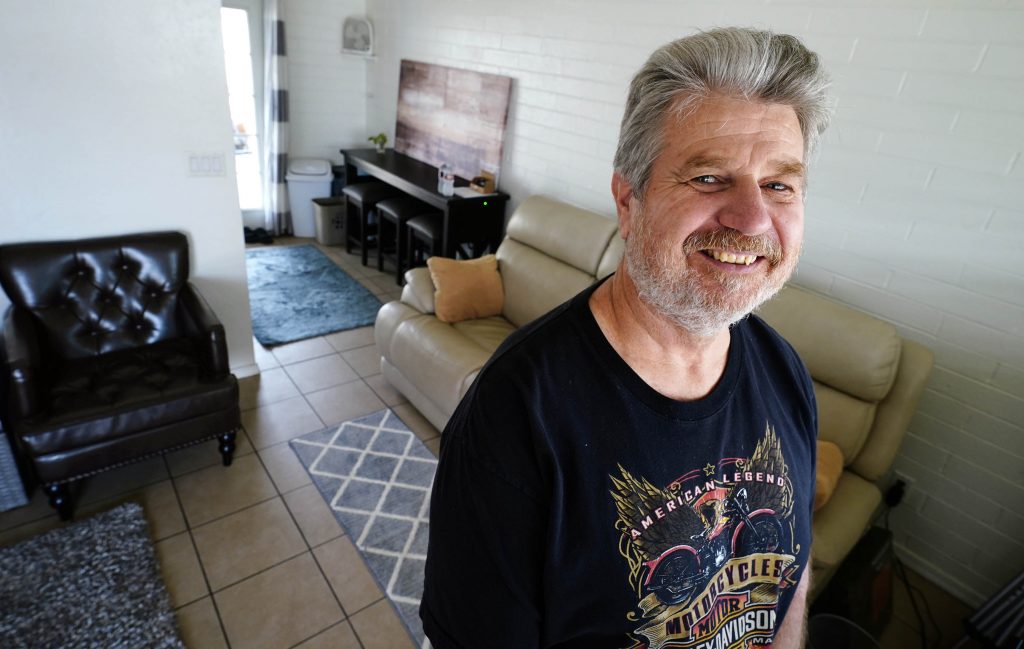
It isn’t luxury — a cinder block, 473-square-foot apartment in a north-central Phoenix neighborhood, where Steve Ryan yells across the street from his front door to a visitor, “Don’t park in front of there, that’s a fentanyl dealer” — but it’s his.
He used to live in his Ford Expedition.
He offers a seat on a chair from GCU CityServe, a warehouse that has donated more than $5 million of household goods and supplies to families in need in the 18 months since it opened. He plops on his big sofa, smiling when he pops out the recliner footrest.
Six years ago, at age 48, Steve had a heart attack, and five more followed within the next year. The doctor predicted he would soon die.
“All the sudden, I’m going from running my own (concrete contractor) business, being in ministry, owning my own home, being a husband and father, to selling my house, getting rid of the business and fancy trucks, and not being able to pay for my kids’ college, not knowing what to do next,” he said.
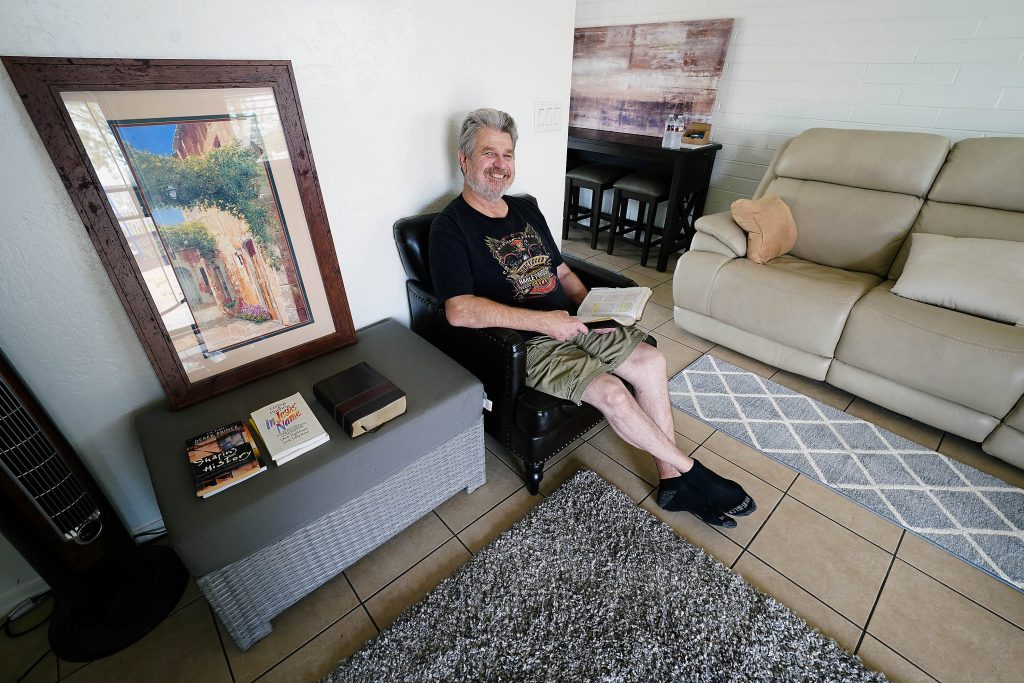
Acquiring a taste for pain killers during his treatment and taking medications to combat anxiety and depression, Ryan decided, the heck with it. His life was nearing an end, he would break bad.
“I decided I wasn’t going to live in a hospital bed waiting to die. I declared, ‘If I’m gonna burn out, I’m going to go out hard. I’m going to do the things I always wanted to do.’ I bought a motorcycle. I went to Sturgis. I felt like God had abandoned me. I had this whole life planned out. All the sudden the plans were nothing — and still are. It was God’s plan.”
The plan was painful at first. He spiraled out of control and began using fentanyl, a dangerous synthetic opioid that made him feel like nothing mattered. Six hours after he took it, the severe anxiety for another fix kicked in. Then it mattered to get more.
He lost everything, decided he couldn’t put his family through any more and began living out of his Expedition, which he drove to three violations for driving under the influence. He tried to commit suicide twice, brought back to life by naloxone, a medicine that rapidly reverses opioid overdose. He ended up in jail after pleading guilty to a March 2020 disorderly conduct felony and was eventually sentenced to two years of probation.
It doesn’t thrill him to sit on the sofa from CityServe and tell all this. He led a respectable life.
But in the CityServe warehouse, there’s no judgment.
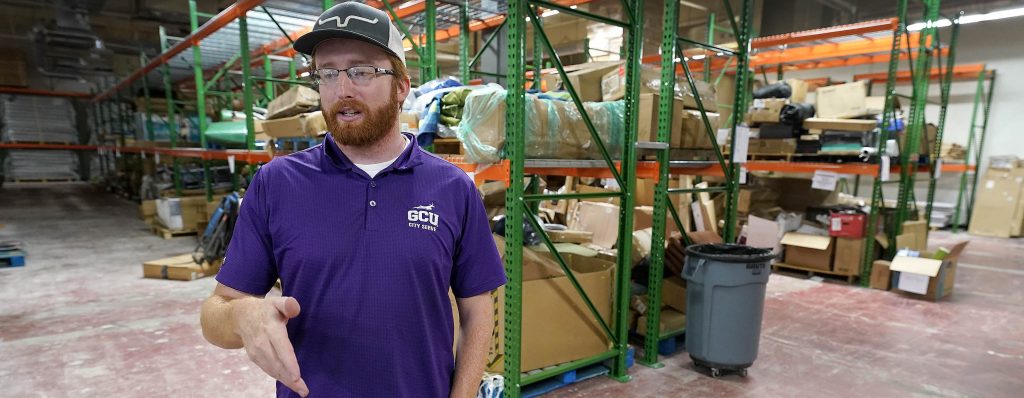
Nathan Cooper has heard a lot of these stories as CityServe HUB Manager. The warehouse helped distribute $5 million in surplus goods to 9,500 families since September 2021.
The first story from GCU CityServe, of a Vietnam veteran, he remembers the best. His grandpa was a vet and told him they followed two paths after the war — his way, of following God, and the path of others, who chose addiction and homelessness.
“Finally, he was able to get help with a place to live, and we helped him furnish it. He walked through and picked out a sofa, and that sticks with me,” Cooper said. “I’ve never felt so fulfilled. You can see the impact we are having on a day-to-day basis.”
Cooper grew up in the Midwest and took things for granted, like sitting down with family at a dining room table.
“I remember a couple in their 30s we helped move into an apartment who were homeless,” added Paige McMahon, the CityServe POD Relations Manager. “We had a dining room table big enough for two, a barista table. I remember pulling the dolly around the corner with the table, and she just lost it. She said, ‘I have never had a dining room table. My childhood was spent in hotel rooms or on the street. We can sit down and eat dinner. I can’t tell you what that means.’”
McMahon was called when Steve Ryan was in need.
He had hit bottom. After getting off drugs long enough to buy a mobile home, he went back to his old ways, driving to Tempe to pick up fentanyl pills and praying for God to help him. That’s when a police officer stopped him, and he was ordered into treatment.
“That was the answer to my prayer,” he said.
At Adult & Teen Challenge, he was connected to Scottsdale Illuminate Community Church’s transitional housing, House of Refuge. After six months there, he was placed in its alumni apartments two months ago, but his apartment was bare.
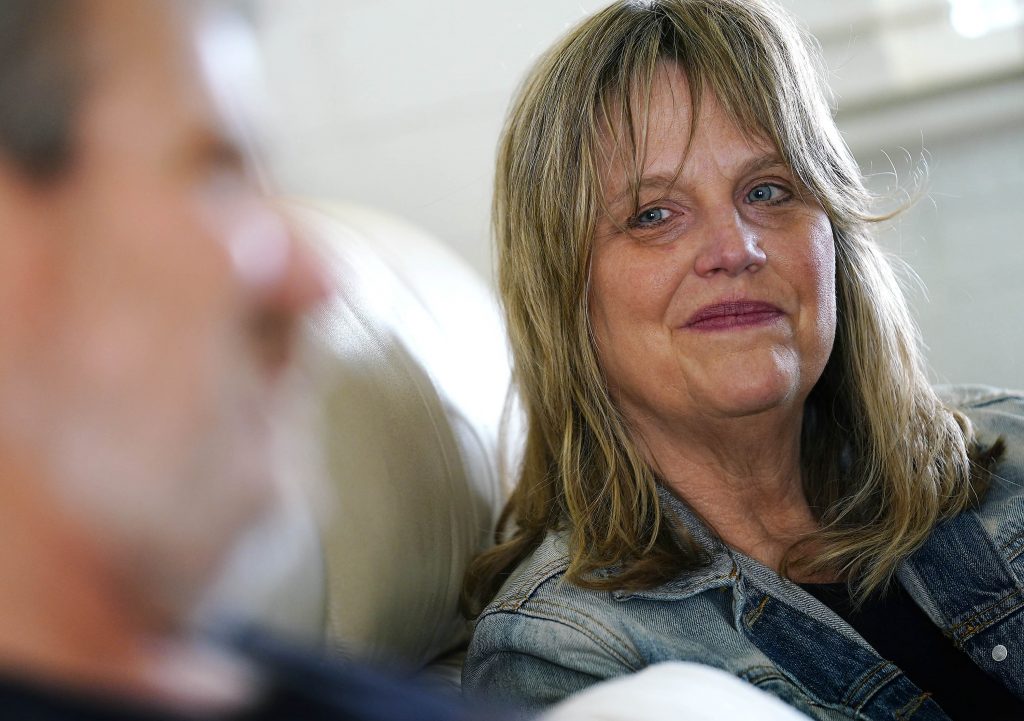
Emily Talpas, who’s in local outreach with Illuminate, one of CityServe’s many community partners, knew who to contact. McMahon took the last-minute call that Talpas needed items for four apartments, one being Ryan’s.
That sofa and chair, a dining room table, a dresser and bed, patio furniture, wall art and household supplies from CityServe filled his new place and the other three apartments.
“What makes it special is just realizing that our brothers and sisters in Christ are all in different places,” said Talpas, looking to Steve. “You are my brother. So (CityServe) is a sweet resource to help those people get back on their feet.”
By Steve’s new chair, where he sits to read, is a Bible, each page worn out, each page marked. He now pays it forward by making food for the church and driving it to the homeless.
“My life is not my own anymore. I should not be here,” Ryan said. “Whatever life I have belongs to God. He brought me back.”
People ask him his plans when he moves out in four months. He is no longer a slave to his reputation, power, money or education. He is a servant, he said. His wife, who he has been separated from, is talking to him again. So are three of his four children.
Today, sitting on his sofa, he is transformed
At Nazar and Vlad’s English class
Nazar Vuskevych, 17, is from Lutsk, Ukraine, where Russian soldiers didn’t invade his town, he said, but their “bombs and rockets” did.
“I don’t know what to do. I was at home. I wake up at 4 a.m. when they start war,” he said in his newly learned English. “All the people scared. Yelling.”
He escaped with brother Vlad Dmytrienko, 24, and Vlad’s girlfriend, Khrystyna Fedash. They lived in a camp in Poland, then in Mexico City. “I dream about America. To live there. America is United States, one of the best countries in the world,” Nazar said.
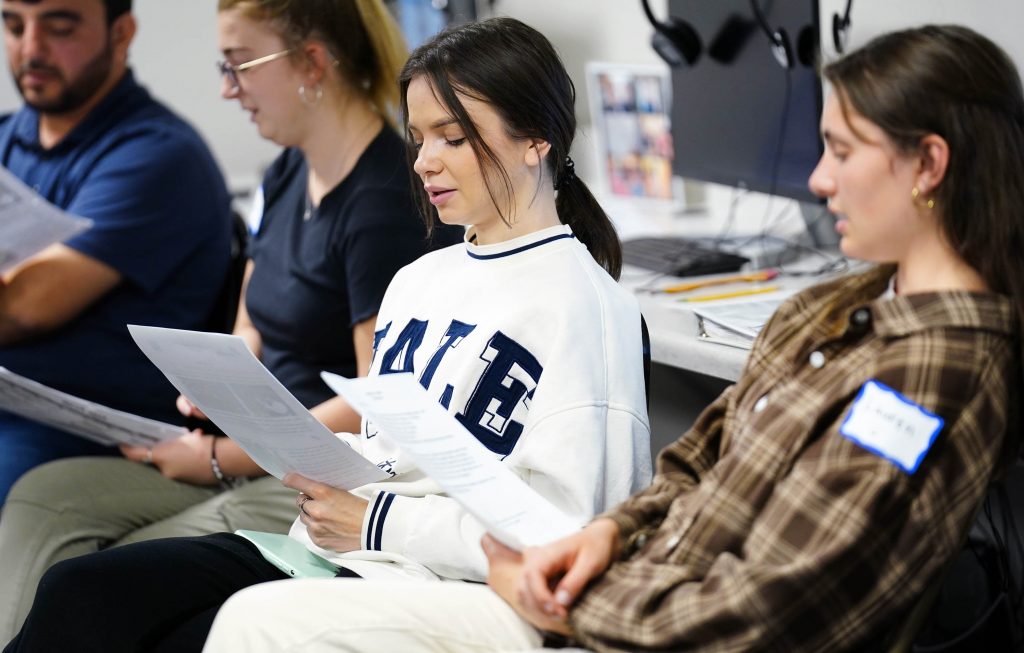
“It’s best,” added Vlad. “More work. More happy people.”
But when they arrived in Phoenix to live with an uncle, they knew little English.
That’s where Gary Van De Velder and his faith-based Abounding Services comes in with a steady cadre of GCU student volunteers to help refugees learn English. Nazar, Vlad and Khrystyna sat among several GCU students at North Phoenix Baptist Church, just a few miles east of campus, figuring out how to say “roof” in English.
“They probably came to GCU for a reason,” he said of the college students’ desire to serve, “and they bring that reason over to us.”
The refugees come from all over the world — Ukraine, Afghanistan, Congo, Myanmar.
He said learning English changes a family’s trajectory, keeping parents and children together by sharing the language. Knowing English also helps them fill out job applications, become citizens and become part of the community. One native of Congo without a word of English came to classes for six years and recently bought a house in Goodyear.
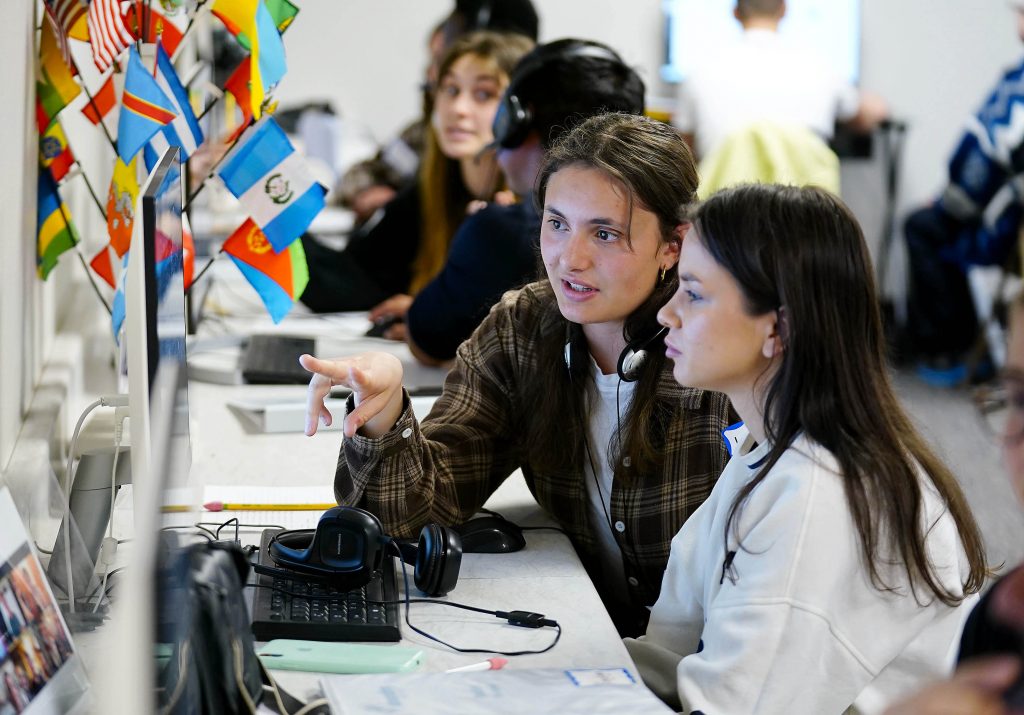
“But what I want most, in my heart of hearts, is I want these GCU students to get to know the refugees and their issues. It will change their lives. I use the word transform. I want to transform the lives of volunteers.”
GCU student Lauren Cook is working with Khrystyna on the word “roof.” She draws a square with a triangle on top and points to it, and they practice the “oo” sound.
“I wanted to be a teacher all my life, and I’ve never worked with refugees before, so this is a good way to combine those things,” Cook said. “I really like getting to know people from all over the world and how we are all not that different. It’s a mutual thing because I am learning something, too.”
Khrystyna, she learned, studied marketing in Ukraine, but here hopes to do nails. She says of the college students: “You very kind. You helping us. We thank you.”
Many of the students are linked to the effort through GCU Global Outreach, where coordinator Brennan Smith found his passion as a college student encouraging refugees in English classes.
“The biggest thing is just to have the opportunity to have a welcoming face, a warm, English-speaking face from the U.S. to kickstart their dreams,” Smith said.
He’ll never forget one student who had the humble dream of starting a gas station and wanted to learn English. Some Afghanistan students just wanted to share their food as a form of worship.
“When I got involved in Global Outreach, I became more aware of what worship meant. It can be actualizing the gift of English speaking, it can be cooking for your family or the desire to open a gas station,” he said.
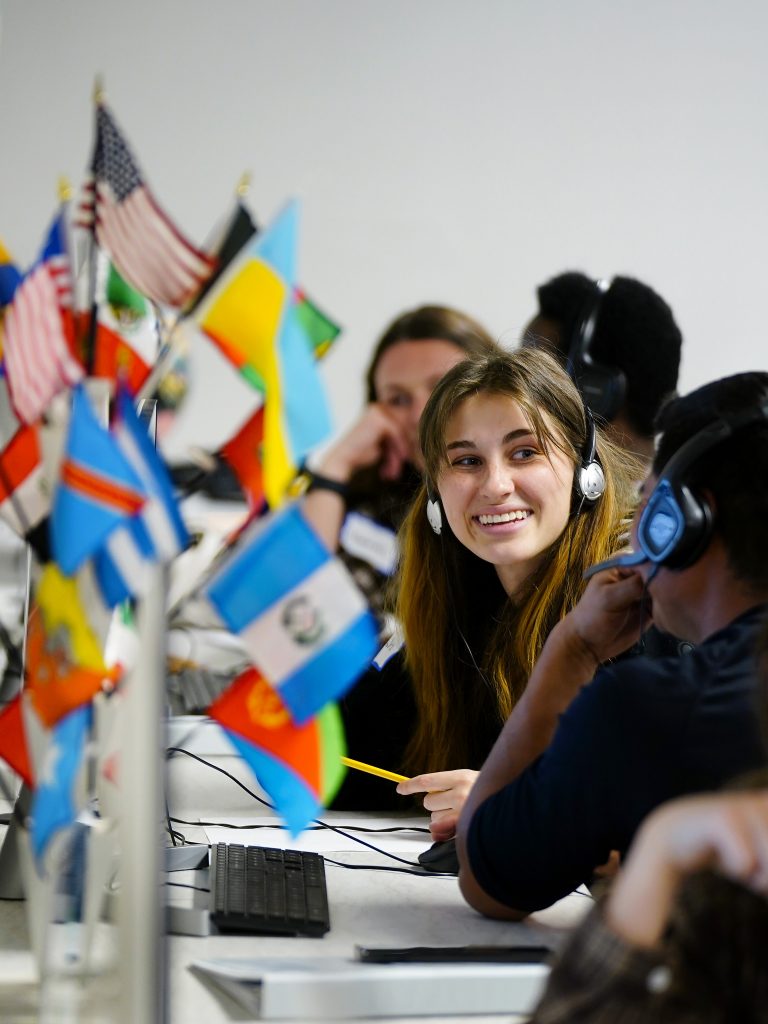
Six GCU volunteers sat at computers working through language, such as Hannah Beggs. The psychology major remembers the times when she could do nothing but smile or gesture and saw the refugees pick up the language and the confidence to do simple things, like go to the grocery store.
“I want them to feel like a part of the community rather than outside it, and learning the language is crucial to that,” she said.
The Ukrainians, who hope their families back home are OK after watching news about the war, work Monday through Friday at a recycling center and still drive a half hour four days a week to learn English.
Learning to speak better will help them advance in jobs and make friends. It will transform their lives.
“It’s the good guys,” Vlad says of the students. “I like American people.”
Mama Jo’s karaoke
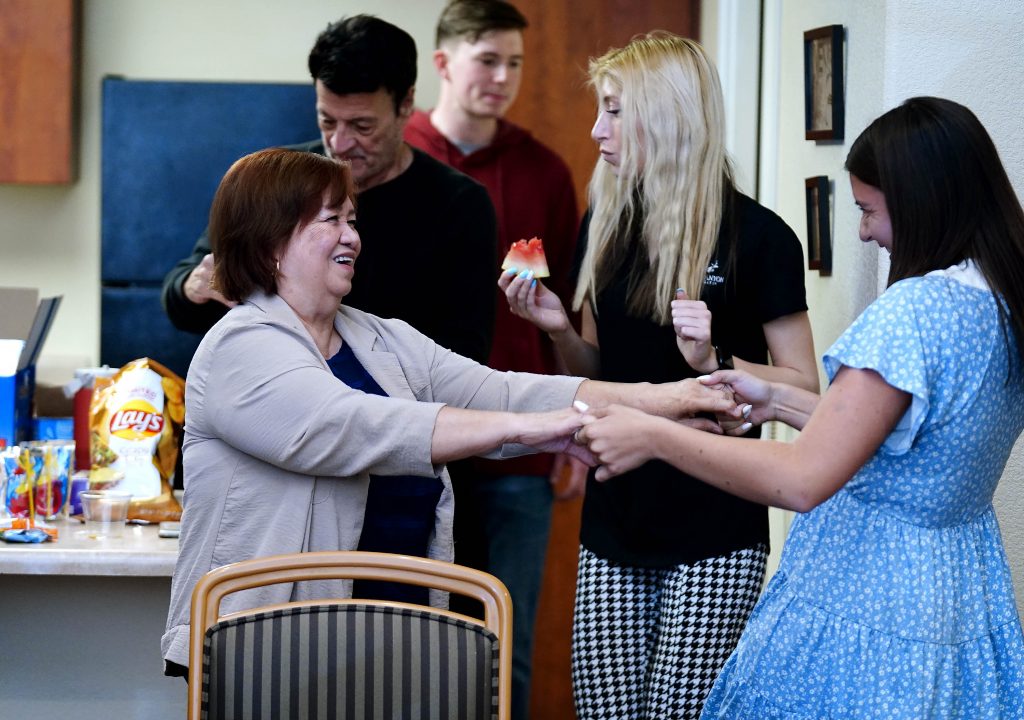
Josefina Khatib has no family nearby. The 79-year-old laments that it’s hard to communicate with the other 50 or so residents of numerous nationalities in her low-income senior apartment complex, especially those without much English. “No one talks to them,” she said.
But on Tuesday nights, Khatib and her fellow residents at Colter Commons, sandwiched amid GCU’s campus, can certainly sing. Karaoke Night is one of their favorite activities with GCU students, who come over to engage them in a little fun. They belt out the response prompt from resident Bernie Bearinger, who is singing “Rockin’ Robin.”
“Oriole,” Khatib yells.
Bearinger, 79, is a musician who writes his own songs, crooning: “I’m standing at the end of my road … I fought a good fight, ran a good race.”
But these seniors are not done with the race.
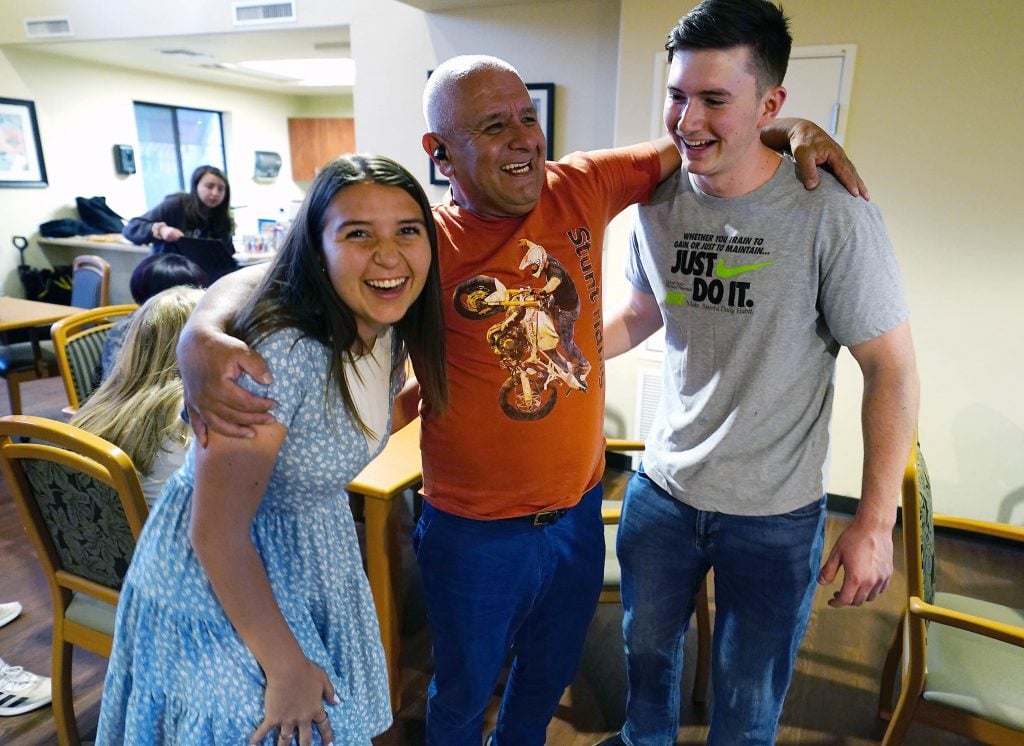
Resident Jaime Ramirez, who has limited English, begs GCU freshman Shannon Nearhoof to sing the Mexican folk song “Cielito Lindo” with him, and they do a lot of “aaay, ay, ay, aaayyy.”
Khatib is grateful. Students call her Mama Jo. “All the students give their effort, their love, their dedication to give joy to the residents, especially those that don’t have family here.”
Student Clay Albright is one of her favorites. He’s been volunteering with Local Outreach at Colter for three years. “It’s very life giving,” he said. “Just to be around their wisdom, hear their stories. They love hearing from us, and we love hearing from them.”
Mama Jo, a native of the Philippines, makes it clear she is not a lonely, inactive senior. Her days start by 4:30 a.m. She prays, goes to choir and attends physical therapy. But six years ago, she began to get to know students, and it changed her life. They knock on her door to play a game, ask her to join them on campus for a food event or just to borrow an ingredient from her kitchen.
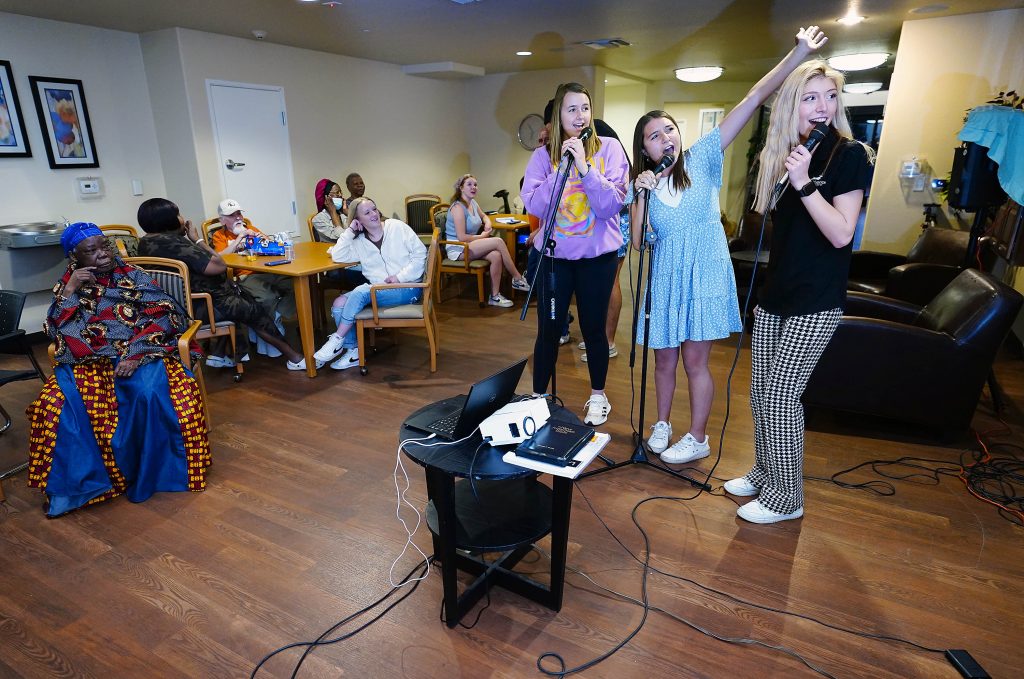
She has photos of students on her wall, attends their graduations and hears about their relationships and marriages.
But she worries about other Colter residents. “They just watch TV. The only time they come out of the shell is when the students come here.”
GCU Local Outreach Coordinator Alexis Lopez said she helped create the outreach in 2015 and found that seniors just want to be heard, especially those without family around. Roughly 15 students a week come over for different events.
Residents clap along when students sing, like the woman in traditional African attire that Mama Jo points out.
“I will see her go back and forth and nobody says hi. She just walks and walks because she can’t say a word,” she said.
No one knows her story, though the students have tried. They only know she comes from Burundi.
Gearhoof sat down with her during a craft day and painted her country. “She understood that. She painted the U.S., so we had a little thing. I can’t image what she’s going through, but she comes every week, and she put the thing I painted on her fridge. That just warmed my heart.”
Students are sad to hear of residents’ deaths.
Resident Martha Mekondo got up to sing a song for them. “They pass away, and we are still thinking about them. We talk about them. Sometimes we cry,” she said before singing their names and how they decided to follow Jesus, “no turning back, no turning back.”
Yet what they get from each other, these students and senior citizens, is transformative.
Said Mama Jo, “I never had so much love.”
Grand Canyon University senior writer Mike Kilen can be reached at [email protected] or at 602-639-6764.















